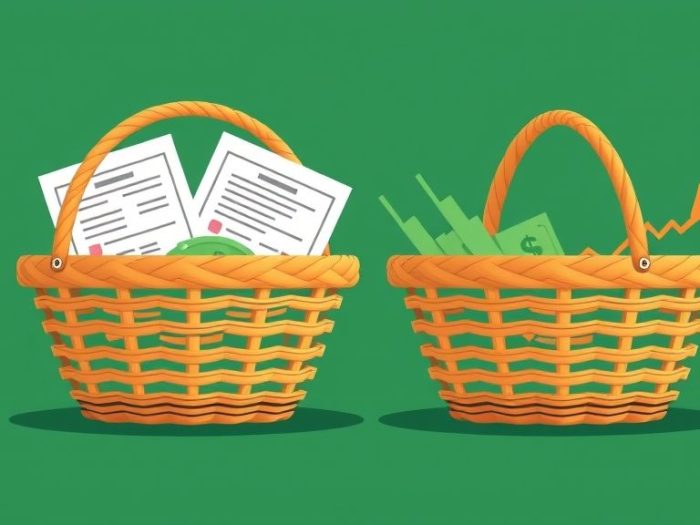Commodities offer diversification and potential returns, but how should retail
investors access this market? Commodity ETFs and futures contracts are two common
options, each with its own characteristics. This article compares commodity ETFs
and futures to help you determine which is better suited for your investment goals.
Understanding Commodity ETFs
Commodity ETFs (Exchange-Traded Funds) are investment funds that track the price of
a single commodity (e.g., gold, oil) or a basket of commodities. They trade on stock
exchanges like stocks, making them easily accessible.
Pros of Commodity ETFs:
- Accessibility: Easy to buy and sell through a brokerage account.
- Liquidity: Generally high trading volume and liquidity.
- Transparency: Holdings are typically disclosed.
- Lower Capital Requirements: Don’t require the large sums of money needed for futures trading.
Cons of Commodity ETFs:
- Tracking Error: May not perfectly track the underlying commodity’s price due to factors like storage costs and contract rollovers.
- Expense Ratios: ETFs charge expense ratios, reducing your returns.
- Not Direct Ownership: You don’t own the physical commodity.
Understanding Commodity Futures
Commodity futures are contracts that obligate the buyer to purchase or the seller to
deliver a commodity at a predetermined price and date in the future. Futures are
traded on specialized exchanges.
Pros of Commodity Futures:
- Leverage: Futures offer leverage, allowing you to control a large contract with a smaller amount of capital.
- Potential for High Returns: Leverage can amplify profits.
- Direct Exposure: Provides direct exposure to commodity price movements.
Cons of Commodity Futures:
- High Risk: Leverage also magnifies losses, making futures trading very risky.
- Complexity: Futures trading requires a deep understanding of market dynamics and trading strategies.
- Margin Requirements: You must maintain margin in your account to cover potential losses.
- Expiration Dates: Futures contracts have expiration dates, requiring you to close or roll over your position.
Commodity ETFs vs. Futures: Which is Better for Retail Investors?
For most retail investors, commodity ETFs are generally a better choice.
Here’s why:
- Risk: ETFs are significantly less risky than futures due to the lack of leverage.
- Capital: ETFs require less capital to get started.
- Complexity: ETFs are simpler to understand and trade than futures.
- Accessibility: ETFs can be traded through any brokerage account.
Futures are more suitable for experienced traders and institutional investors who
understand the risks and have the capital and expertise to manage them.
Conclusion
Commodity ETFs provide a more accessible and less risky way for retail investors to
gain exposure to the commodity market. While futures offer the potential for higher
returns, they come with substantial risks and complexity. Choose the investment option
that aligns with your risk tolerance, investment goals, and experience level.
Related Keywords
Commodity ETFs, commodity futures, investing in commodities, commodity trading, ETFs vs.
futures, gold ETFs, oil futures, commodity market, commodity investment, commodity
trading for beginners.
Frequently Asked Questions (FAQ)
1. What are commodity ETFs?
Commodity ETFs (Exchange-Traded Funds) are investment funds that track the
price of a single commodity or a basket of commodities and trade on stock
exchanges.
2. What are commodity futures?
Commodity futures are contracts to buy or sell a specific quantity of a
commodity at a predetermined price and date in the future.
3. What are the advantages of commodity ETFs?
Advantages include accessibility, liquidity, transparency, and lower capital
requirements.
4. What are the disadvantages of commodity ETFs?
Disadvantages include potential tracking error, expense ratios, and the fact
that you don’t own the physical commodity.
5. What are the advantages of commodity futures?
Advantages include leverage and the potential for high returns, and direct
exposure to commodity price movements.
6. What are the disadvantages of commodity futures?
Disadvantages include high risk due to leverage, complexity, margin
requirements, and contract expiration dates.
7. Which is riskier, commodity ETFs or futures?
Futures are significantly riskier than ETFs due to the use of leverage.
8. Which requires more capital, ETFs or futures?
Futures trading generally requires more capital due to margin requirements.
9. Which is easier to trade for beginners, ETFs or futures?
ETFs are simpler to understand and trade, making them more suitable for
beginners.
10. Which is generally better for retail investors, ETFs or futures?
For most retail investors, commodity ETFs are generally a better choice due
to lower risk, capital requirements, and complexity.



